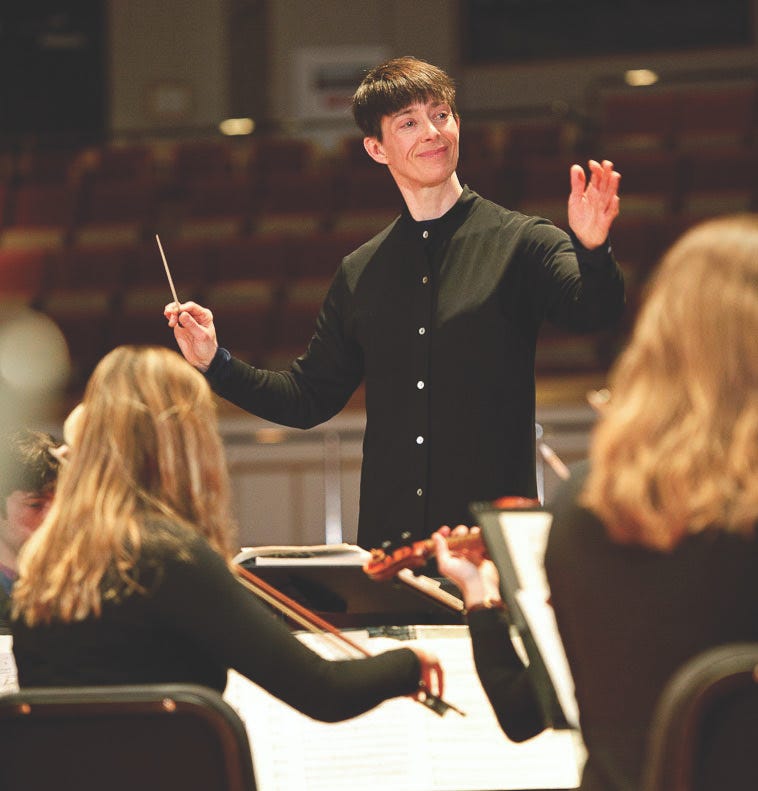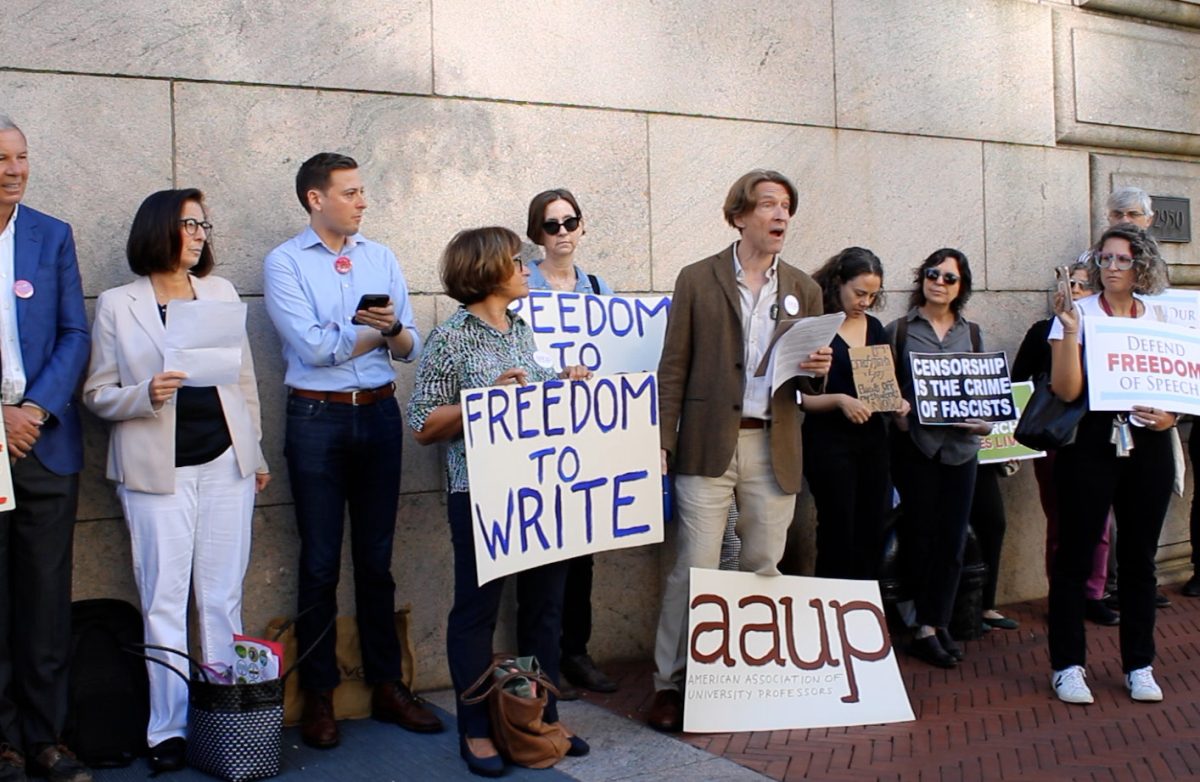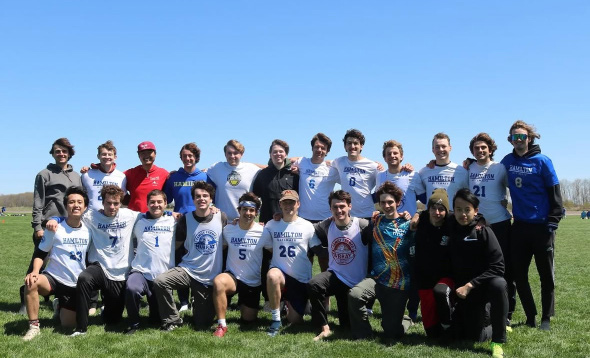
Syracuse’s Society for New Music is bringing their opera,
Pushed Aside
, to the Hill on Saturday, Apr. 13 in Wellin Hall at 7:30 PM.
Pushed Aside
follows the life of suffragist Matilda Joslyn Gage and her fight for women’s rights. The opera stars Hamilton’s Choir Director, Professor Danan Tsan, as Gage and is conducted by Hamilton’s Orchestra Director and Music Department Chair, Professor Heather Buchman.
Gage was born in 1826 in Cicero, New York, a town just north of Syracuse. She was exposed to activism at a young age; her father was a well-known abolitionist, and her childhood home was a stop on the Underground Railroad. In 1845, Gage started a family in Fayetteville, New York, just east of Syracuse.
Gage first publicly spoke out about gender inequality at the National Woman’s Rights Convention in 1852. She continued to fight for gender equality, particularly women’s right to vote, publishing articles and giving public speeches throughout her life. Gage was also one of the first activists to advocate for birth control education and rights for women in divorce trials. In 1869, Gage founded the National Woman Suffrage Association with suffragists Susan B. Anthony and Elizabeth Cady Stanton. She also collaborated with Anthony and Stanton on several projects and books including
The History of Woman Suffrage
(1881–1887) and
Women, Church, and State
(1893).
Gender equality in the Haudenosaunee Native American tribe, local to Central New York, inspired much of Gage’s work. Seeing the power that women held in their society, she drew on it as a model for her advocacy for women’s rights. Gage was adopted into the Wolf Clan of the Mohawk Nation in 1893, and expressed awe in how her rights as a member of the Haudenosaunee tribe were radically different from her rights as a member of her own community. She could vote in the Haudenosaunee tribe, yet that same year she went on trial for voting in a local school board election.
In addition to women’s rights, Gage also fought for Native American rights and was a staunch abolitionist. While Anthony and Stanton are well-known today, Gage was left out of most history books because of her open criticism of religion, which she saw as a key factor in the roots of the women’s oppression. Although the enfranchisement of women did not come until after Gage’s lifetime, her importance and influence on the suffrage movement is now considered undeniable.
The founder of the Society for New Music, Neva Pilgrim, provided the impetus for the idea of
Pushed Aside
. Pilgrim hoped to bring focus to an important local figure from the women’s suffrage movement and have the premiere of the opera coincide with the 100-year anniversary of women’s enfranchisement in New York State in 1917.
Pushed Aside
premiered on Jan. 21, 2017 — coincidentally, the same day as the historic Women’s March on Washington, D.C., in 2017.
Buchman says she is excited about the predominantly-female creative team of
Pushed Aside
. The composer, librettist, conductor, and stage director are all women, appropriate for this feminist focused production. For the past two years,
Pushed Aside
has travelled to high schools, colleges, and theatres across Central New York.
Pushed Aside
features a ten-person orchestra and a cast of eight singers, all from Central New York. The singers play Gage, Anthony, Stanton, Gage’s daughter, Gage’s son-in-law, and two Native American doctors, with one singer portraying an escaped slave in the first act and abolitionist Frederick Douglass in the second. Additionally, for this performance, Hamilton College Choir member Emily Brewer ’21 will join the ensemble.
The musical style of
Pushed Aside
is American Romantic, with complex harmonies, rhythmic structures and beautiful, expressive melodies. It also uses folk material from the civil war period. The opera is in English, with supertitles projected on a screen to help audience members follow along. Additionally, the opera’s libretto makes significant use of the writings of Gage, Anthony, Stanton, and Douglass.
Tsan, who plays Gage in Pushed Aside, takes great joy in portraying such a powerful woman. “I think that she’s one of the coolest people that I’ve ever learned about,” she said. “Her life was so multi-faceted, and she had such a forward-thinking way about her.”
“It was stunning to me to learn that there was this other woman who worked on a team for nearly forty years with [Anthony and Stanton],” Buchman adds. “The more I learn about Matilda, the more I’m struck by her nobility.”
Reflecting on a few of her favorite moments from the opera, Buchman says, “In Act One, Scene Four, Matilda is helping an enslaved person who’s fleeing on the Underground Railroad […] In their conversation Matilda starts reflecting ‘After the wedding, I became something like a — something like a — I mean, with the children and all, I am not exactly free.’
“You see her register own shock at what she almost said. It is a shocking moment for the audience as well. I really love these edgy moments in the opera — there are several of them, and that makes the work feel bold and uncannily resonant for our time.”
Buchman highlights another critical scene in
Pushed Aside
: “There’s a moment in the beginning of the second act where [Gage, Anthony, and Stanton] are sitting around and they’ve been at this for twenty some-odd years, and they’re getting nowhere. The other two are getting really discouraged and Matilda says ‘You mustn’t be disheartened, I have developed a new strategy,” and the music just brightens up and it starts sparkling again, and it brings the other two back to life.”
Buchman also encourages audience members to pay attention to the nuances and emotional depth of the second-to-last scene of the opera in which Gage splits from her partnership with Anthony and Stanton.
Putting together a project of this scope can bring about challenges for the performers and creative team.
Tsan says, “Learning [
Pushed Aside
] musically has been very difficult because there aren’t any arias or recitative as in traditional opera, so everything is through-composed. And with the changing meter and more complex harmonic structures, it can be difficult to get it in your ear.”
Buchman speaks to the difficulties of the complex thematic material. “One of the scenes we found challenging at first was a scene with just Susan B. Anthony and Frederick Douglass, they were friends, and in an earlier scene Susan B,” she said. “Anthony says how devastated she was by the passage of the Fifteenth Amendment not including women […] At the moment of this particular conversation he’s already achieved his major civil rights battle and Susan B. Anthony […] has not. So the power dynamics and the notion of privilege in this particular scene are really complicated.”
Buchman also emphasizes important reasons why people should come to see
Pushed Aside
: “Matilda Joslyn Gage is speaking the language of intersectionality over 150 years ago, before we even had that term of intersectionality […] The point of view that she developed is very modern and very relevant to our times […] It’s very inspiring to see how these people just didn’t give up, and that we can learn from other cultures.”
Hamilton community members who are interested in learning more about Gage’s life are encouraged to attend a preview discussion of the opera, Gage, and the history of women’s suffrage on Friday, Apr. 12 from 12:00 to 12:50 PM in Schambach 201. Visiting Assistant Professor of Religious Studies Brent Rodriguez-Plate will lead the discussion.

















